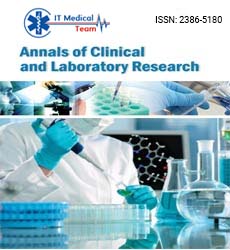Opinion - (2023) Volume 11, Issue 4
Vaccine Development and Distribution: CDC's Efforts in Disease Prevention
Karin Taitel*
Department of Allergy and Infectious Diseases, University of Bethesda, Maryland, United States
*Correspondence:
Karin Taitel, Department of Allergy and Infectious Diseases,
University of Bethesda, Maryland,
United States,
Email:
Received: 18-Jun-2023
Published:
14-Jul-2023, DOI: 10.36648/2386- 5180.23.11.472
Introduction
Vaccine development and distribution play a pivotal role in
preventing the spread of infectious diseases and safeguarding
public health. The Centres for Disease Control and Prevention
(CDC), as the leading national public health agency in the United
States, plays a vital role in coordinating efforts to develop
and distribute vaccines. This article will delve into the CDC's
endeavours in disease prevention through its comprehensive
approach to vaccine development, including research, testing,
and distribution strategies [1].
The CDC actively engages in research and development initiatives
to create effective vaccines against various diseases. Through
collaborations with public and private entities, the CDC identifies
key pathogens and conducts extensive research to understand
their characteristics, transmission, and potential vaccine targets.
This knowledge forms the foundation for the development of
safe and effective vaccines. The CDC utilizes its vast network
of scientists, epidemiologists, and healthcare professionals
to conduct preclinical studies, including laboratory testing
and animal trials, to assess vaccine safety and efficacy.
This rigorous process ensures that only the most promising
candidates progress to clinical trials, minimizing risks to
human participants [2].
Once vaccine candidates show promise in preclinical studies,
the CDC plays a vital role in organizing and overseeing clinical
trials. These trials involve human volunteers and are conducted
in multiple phases to evaluate safety, dosage, and efficacy. The
CDC collaborates with pharmaceutical companies, academic
institutions, and other stakeholders to design clinical trial
protocols, recruit participants, and monitor the progress of trials.
These efforts ensure that vaccines meet rigorous safety and
efficacy standards before they are approved for public use.
The CDC also prioritizes vaccine safety monitoring post-approval.
Through its Vaccine Adverse Event Reporting System (VAERS) and
the Vaccine Safety Data link (VSD), the CDC continuously monitors
and investigates any potential adverse effects associated with
vaccines [3]. This active surveillance enables the identification of
rare side effects and the implementation of timely interventions,
further ensuring public confidence in vaccination programs.
The CDC plays a central role in coordinating the distribution and
administration of vaccines across the United States. It collaborates with federal, state, and local partners to develop comprehensive
vaccination strategies and ensure equitable access to vaccines.
The CDC's Advisory Committee on Immunization Practices (ACIP)
provides guidance on vaccine prioritization and administration
[4]. This expert committee reviews scientific evidence and
formulates recommendations for vaccine use, taking into
account factors such as disease burden, vaccine effectiveness
and population demographics.
To facilitate vaccine distribution, the CDC operates the Vaccine
Tracking System (VTrckS), a secure online platform that monitors
vaccine inventory and distribution in real-time. This system
enables efficient allocation of vaccines to healthcare providers,
ensuring adequate supply and reducing wastage. Furthermore,
the CDC works closely with state and local health departments
to establish vaccination sites, including clinics, pharmacies, and
mobile units. It provides training and resources to healthcare
providers on proper vaccine storage, handling, and administration
techniques, ensuring the integrity and effectiveness of the
vaccination process [5].
Conclusion
The Centres for Disease Control and Prevention (CDC) play
a crucial role in vaccine development and distribution as
part of its broader efforts in disease prevention. The CDC is
committed to safeguarding public health by conducting research,
monitoring infectious diseases, and collaborating with various
stakeholders to develop safe and effective vaccines. The CDC's vaccine development efforts involve extensive research,
including epidemiological studies, clinical trials, and laboratory
investigations. Through these activities, the CDC identifies and
understands the pathogens causing diseases, assesses their
impact on public health, and determines the most effective
strategies for vaccine development.
References
- Banks HT, Castillo-Chavez C (2003). Bioterrorism: mathematical modeling applications in homeland security. SIAM J Appl Math.
Indexed at, Google Scholar, Cross Ref
- Daulaire N (2014). HHSâ??Supporting Global Immunization through Policies, Programs and Partnerships. Public Health Rep. 129:1-3.
Indexed at, Google Scholar, Cross Ref
- Excler JL, Saville M, Berkley S, Kim JH (2021). Vaccine development for emerging infectious diseases. Nature Med. 27(4):591-600.
Indexed at, Google Scholar, Cross Ref
- Li Y, Tenchov R, Smoot J, Liu C, Watkins S, Zhou Q (2021). A comprehensive review of the global efforts on COVID-19 vaccine development. ACS Central Science. 7(4):512-33.
Indexed at, Google Scholar, Cross Ref
- Willingham III AL, Harrison LJ, Fevre EM, Parkhouse ME (2008). Inaugural meeting of the cysticercosis working group in Europe. Emerg Infect Dis. 14(12):2.
Indexed at, Google Scholar, Cross Ref
Citation: Taitel K (2023) Vaccine Development and Distribution: CDC's Efforts in Disease Prevention. Ann Clin Lab Res. Vol.11 No.4:472






